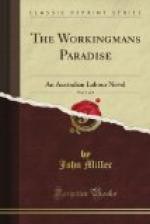“You see, Ned,” she went on. “Mary couldn’t help it. It’s easy enough to talk when one has everything one wants or pretty well everything but when one has nothing or pretty well nothing, it’s different. I’ve been through it and know. The insults, the temptations, the constant steady pressure all the time. If you are poor you are thought by swagger people fair game. And, even workingmen, the young ones, who don’t think themselves able to marry generally, help hunt down their working sisters. Women can’t always earn enough to live decently and men can’t always earn enough to marry on; and when well-to-do men get married they seem to get worse instead of better, generally. So upon the hungry, the weary, the hopeless, girls who have to patch their own boots and go threadbare and shabby while others have pretty things, and who are despised for their shabbiness by the very hypocrites who cant about love of dress, and who have folks at home whom they love, and who are penniless as well and in that abject misery which comes when there isn’t any money to buy the little things, upon these is forced the opportunity to change all this if only for a little while. Besides, you know, women have the same instincts as men—why do we disguise these things and pretend they haven’t and shouldn’t when we know that it is right and healthy that they should?— and though it is natural for a woman to hate what is called vice, because she is better than man—she is the mother-sex, you know—yet the very instincts which if things were right would be for good and happiness seem to make things worse when everything is wrong. Women who work, growing girls as many are, have little pleasure in their lives, less even than men. And wiseacres say we are light and frivolous and chattering, because most women can only find relief in that and know of nothing else, though all the time in the bottom of their hearts there are deep wells of human passion and human love. If you heard sewing-room talk you would call us parrots or worse. If you knew the sewing-room lives you would feel as I do.”
He did not know what to say.
“For myself,” straightening herself with unconscious pride, “it has not been so much. I have been hungry and almost ragged, here in Sydney, wearing another girls dress when I went to get slop-work, so as to look decent, living on rye bread for days at a time, working for thirty-eight hours at a stretch once so as to get the work done in time to get the money. That’s sweating, isn’t it? Of course I’m all right now. I get thirty shillings a week for draping and the wife of the boss wants to keep on friendly terms with Mrs. Stratton and I’m a good hand, so I can organise without being victimised for it. But even when I was hardest up it wasn’t the same to me as to most girls. As a last resort I used to think always of killing myself. That would have been ever so much easier to me than the other thing. But I am hard and strong. I’ve heard my mother say that her father was the first of his people to wear boots. They went barefooted before then and I’m barefooted in some things yet. Mary wasn’t like me, but better, not so hard or so selfish. And so, she couldn’t help it, any more than I can.”




